Books round-up: October
Friday, October 31st, 2014 08:02 pm82.
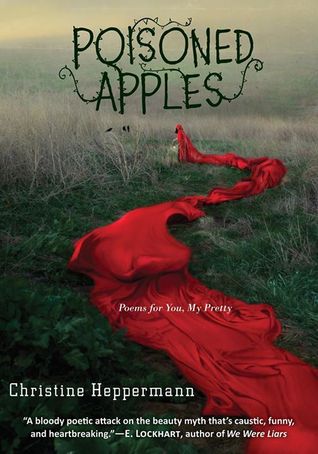
Heppermann, Christine: Poisoned Apples: Poems for You, My Pretty
Feminist fairy tale poetry, a really enjoyable combination. The subjects often address issues of body image and self-worth as well as eating disorders, sometimes a little unsubtle, often times enjoyable through the lens of fairy tales. Some experiences are too US America specific to resonate with me, others seem truly universal.
81.

Abedi, Isabel: Isola
Only read this book if its in your library, or don't, because you already know it and the cardboard characters never really come to life.
Good:
- the cover. Just look: its gorgeous!
- the descriptions of landscapes.
- our heroine is a foreign adoptee looking to return home. Lots of potential there, none of which was realised, sadly.
Bad:
- the insta-plot - you know this story, and this version is incredibly contrived.
- the cardboard characters. They are only defined by one single, easily identifiable trait and by the end I didn't care about anyone.
- the insta-love at first sight forever
- the fact that the female character only breaks her habit of being a sexy lamp to do really unbelievably stupid and foolhardy things
- the motivation of the central villain are really from the very bottom of the barrel
- the bad foreshadowing ("Later when I remembered this moment I often wondered why we didn't....", "This was the first time I saw HIM...", etc.)
80.
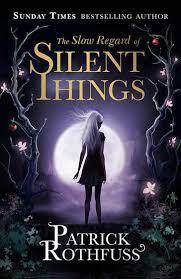
Rothfuss, Patrick: The Slow Regard of Silent Things
More later, I have to reread this a couple of times to savour it. For now: The only thing that spoiled my reading experience of this beautiful volume was the author's constant need to apologise for this story which isn't run-off-the-mill and normal. This is incredible to me, and wrong - more of an apology would be needed for a story that is yet again the same as any other story.
This wasn't, and it was beautiful. I could have done without the frame story of Auri waiting for Kvothe, as I'd have loved to hear more about her time before the beginning of the plot of the Kingkiller Chronicle and her relationship with the masters. As it is, it remains a charming and saddening insight into her wonderous world in the belly of the university.
79.

Snicket, Lemony: Shouldn't You be in School?
I really enjoy this new series, though not as much as I did the ASoUE.
78.

Jung, Marius: Singen können die alle!: Handbuch für Negerfreunde
Sometimes cynical, sometimes funny account of racism in Germany by a black comedian. He talks about his youth growing up as the black child of white middle class parents, his experiences as an actor in a country that still doesn't really realise not all of its inhabitants are whitee and white wannabe saviours.
I don't agree with the fact that political correctness is a bad thing, though I agree that it should not be the only underlying reason for changing one's behaviour.
77.

Harris, Joanne: Gospel of Loki
I like this modern version of the Lokabrenna, which works as a prequel to Runemarks, though some details are different. The contemporary phrases that crop up annoyed me vaguely to the and I didn't see their point. They didn't endear the characters to me, if that was the idea.
Loki is as entertaining and human and as a prequel he couldn't have been much different, though I'd really like to see a Loki that does not suffer from this civilising softening. It makes us understand the characters as humans, but in their original context they were different, revered as forces of nature and arbiters of life a and death. they were also human, of course, but they were still fundamentally different. The difference seems to have home lost and turns gods into powerful mortals, superheroes. In the words of the novel, named and tamed.
76.
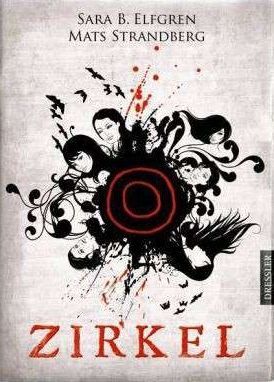
Strandberg, Mats; Bergmark Elfgren, Sara: Zirkel
This is the first book in a long, looong time that I found that is:
1.) centred more or less exclusively on female teenaged characters,
2.) whose main plot isn't a love plot,
3.) who don't get raped.
This is so incredibly rare it really bears mentioning (Seriously. Try thinking of more examples of books that fit these characteristics). And it is a Fantasy book! Of course there are love plots, but they are a part of the story and have usually been established before the plot - teenage witches coming to terms with their powers - starts.
The different girls don't all differ that much from each other, but after some time were believable enough to be interested in. I'm definitely considering reading the sequels.
I don't understand why this book has been compared so widely to completely unconnected books simply because the authors are also Swedish when what we have here is a mix between Charmed with a bit of the Buffy scooby cast thrown in. Set in Sweden, though, sure. It most certainly doesn't have the least bit to do with The Girl with the Dragon Tattoo, and as far as I'm concerned is a better book for that, because grittiness and female characters doesn't always have to be about sexual abuse.
75.

Elsberg, Marc: Zero
The book seems more hurried and breathless than
his last one and less convincing. It is still an entertainingly fast-paced thriller, but the plot has its holes. Especially the random underground chases in Vienna and New York were too much, and while the concerns it raises about tech and choice are valid, it doesn't always do that in a very subtle way. I am also not overly keen on the ableism and the way neuroatypical people are portrayed here.
74.

Carey, Jaqueline: Kushiel's Dart
I really enjoyed this book, and the world, and the fact that there was not as much slut-shaming and whorephobia as might have been expected in a book in which the main protagonist is a prostitute. The world's religious system is believable and interesting and the characters lovable. I don't recall it passing the Bechdel test, but there are several strong female characters and some of them are queer.
I did not like that there are no romantic relationships between women, hardly any sadistic or dominant women, no sadistic/dominant women who aren't evil, no romantic relationships that aren't heterosexual. One toe outside the box and then straight back in
73.

Boie, Kirsten: Ringel, Rangel, Rosen
Karin's living in paradise - she's twelve, the summer holidays are long and warm and a time of wonder, of older boys, of disliking her swimsuit and trying to talk her parents into allowing her to have her to wear a modern short hairstyle. Until her best friend finds a book in the library about children forced to wear stars and who were murdered not too long ago that threatens to mar her brittle paradise with all the questions it raises, because the people who didn't stop this from happening must have been people like her parents. Her brief inquiries are unsettling - her parents don't want to talk about the war, didn't know any Jews, and when the North Sea Flood destroys her home, her life changes forever.
Set in the Hamburg of the late fifties and early sixties, this book is heartbreaking and hits close to home, not only because Karin was born in the same year as my mother, but also because Hamburg is my city and the frail and brittle peace at home she describes, with countless things you can't ask anybody or tell anyone, rings very true and was the lived reality of my grandparents in the years after the war.
The style threatened to lose me several times because the use of repetition just got too much, but just about managed to show a mind grasping at long-held convictions.
72.
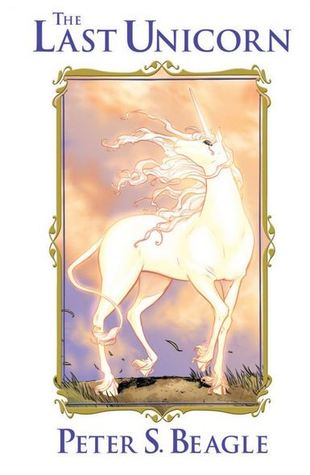
Beagle, Peter S.; Gillis, Peter; De Liz, Renae; Dillon, Ray: The Last Unicorn
I have to admit that I've only read the book two or three times and have seen the movie version so often that I have no memory of how well the book version translates into the movie, which is one of my favourites. So I was not so much worried about the book as I was about my memories of the movie, but it translates, as I suppose this book does into all possible media. The short passages of text seem well-chosen, although as I mentioned I don't remember the text well-enough to judge, but my gut says they are.
The artwork is stunningly beautiful and I could stare at some of those panels for hours. The one thing that bugged me was that Schmendrick and Molly have undergone a serious makeover and the way the human unicorn looks is scary because she is so thin.
71.

Brosgol, Vera: Anya's Ghost
I heard from this via Graphic Novels 4 Girls and really liked it. Anya and the difficulties she faces as a Russian immigrant ring true, although it is strange to me that she doesn't speak Russian at home, though I do understand that would be inconvenient for story purposes. I'd have liked seeing more interactions between Siobhan and Anya, but I can see that it wouldn't have fit into this very compact tale.
I was also positively surprised by this graphic novel as a graphic novel - it's good to see that there are diverse and positive role-models for younger girls at least, even though I find it hard to see the same applying to the "mature" end of this genre, which features gratuitous boob and gore panels more than truly mature topics.
70.
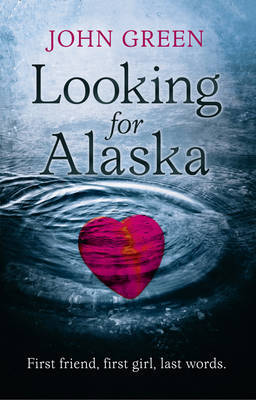
Green, John: Looking for Alaska
The over-the-top love that my students have for this book shows me that I'm probably missing out. But I just don't understand it. I see very interchangeable, uninteresting characters involved in things that I, as a teenager, would have had no interest or part in in their situation because it seems designed to make things worse for them (no matter how bored or depressed, taking up drinking and smoking was never that attractive to me). Though the signs of characters' mental health issues are there in places, they don't ring true to me. The romance plot is superficial and only shows once more how mundanely boring "Pudge" is.
69.

König, Tim: Ich bin ein Kunde, holt mich hier raus
I'm so embarrassed to have read that, even though I did get the audiobook at a very reduced price. It's really bad.
Horror stories of "bad service" in Germany, and most of those aren't really that dramatic. Shops that don't have the coat you wanted in the colour you wanted and don't know that colour is out there so you have to order online, parcel delivery services who don't show up but leave behind the notification that they had tried to deliver your parcel "in your absence", that sort of thing.
68.

Pratchett, Terry: Dragons at Crumbling Castle.
Adorable short stories presented in a way that I can see children liking as much as adult fans.

Heppermann, Christine: Poisoned Apples: Poems for You, My Pretty
Feminist fairy tale poetry, a really enjoyable combination. The subjects often address issues of body image and self-worth as well as eating disorders, sometimes a little unsubtle, often times enjoyable through the lens of fairy tales. Some experiences are too US America specific to resonate with me, others seem truly universal.
81.

Abedi, Isabel: Isola
Only read this book if its in your library, or don't, because you already know it and the cardboard characters never really come to life.
Good:
- the cover. Just look: its gorgeous!
- the descriptions of landscapes.
- our heroine is a foreign adoptee looking to return home. Lots of potential there, none of which was realised, sadly.
Bad:
- the insta-plot - you know this story, and this version is incredibly contrived.
- the cardboard characters. They are only defined by one single, easily identifiable trait and by the end I didn't care about anyone.
- the insta-love at first sight forever
- the fact that the female character only breaks her habit of being a sexy lamp to do really unbelievably stupid and foolhardy things
- the motivation of the central villain are really from the very bottom of the barrel
- the bad foreshadowing ("Later when I remembered this moment I often wondered why we didn't....", "This was the first time I saw HIM...", etc.)
80.

Rothfuss, Patrick: The Slow Regard of Silent Things
More later, I have to reread this a couple of times to savour it. For now: The only thing that spoiled my reading experience of this beautiful volume was the author's constant need to apologise for this story which isn't run-off-the-mill and normal. This is incredible to me, and wrong - more of an apology would be needed for a story that is yet again the same as any other story.
This wasn't, and it was beautiful. I could have done without the frame story of Auri waiting for Kvothe, as I'd have loved to hear more about her time before the beginning of the plot of the Kingkiller Chronicle and her relationship with the masters. As it is, it remains a charming and saddening insight into her wonderous world in the belly of the university.
79.

Snicket, Lemony: Shouldn't You be in School?
I really enjoy this new series, though not as much as I did the ASoUE.
78.

Jung, Marius: Singen können die alle!: Handbuch für Negerfreunde
Sometimes cynical, sometimes funny account of racism in Germany by a black comedian. He talks about his youth growing up as the black child of white middle class parents, his experiences as an actor in a country that still doesn't really realise not all of its inhabitants are whitee and white wannabe saviours.
I don't agree with the fact that political correctness is a bad thing, though I agree that it should not be the only underlying reason for changing one's behaviour.
77.

Harris, Joanne: Gospel of Loki
I like this modern version of the Lokabrenna, which works as a prequel to Runemarks, though some details are different. The contemporary phrases that crop up annoyed me vaguely to the and I didn't see their point. They didn't endear the characters to me, if that was the idea.
Loki is as entertaining and human and as a prequel he couldn't have been much different, though I'd really like to see a Loki that does not suffer from this civilising softening. It makes us understand the characters as humans, but in their original context they were different, revered as forces of nature and arbiters of life a and death. they were also human, of course, but they were still fundamentally different. The difference seems to have home lost and turns gods into powerful mortals, superheroes. In the words of the novel, named and tamed.
76.

Strandberg, Mats; Bergmark Elfgren, Sara: Zirkel
This is the first book in a long, looong time that I found that is:
1.) centred more or less exclusively on female teenaged characters,
2.) whose main plot isn't a love plot,
3.) who don't get raped.
This is so incredibly rare it really bears mentioning (Seriously. Try thinking of more examples of books that fit these characteristics). And it is a Fantasy book! Of course there are love plots, but they are a part of the story and have usually been established before the plot - teenage witches coming to terms with their powers - starts.
The different girls don't all differ that much from each other, but after some time were believable enough to be interested in. I'm definitely considering reading the sequels.
I don't understand why this book has been compared so widely to completely unconnected books simply because the authors are also Swedish when what we have here is a mix between Charmed with a bit of the Buffy scooby cast thrown in. Set in Sweden, though, sure. It most certainly doesn't have the least bit to do with The Girl with the Dragon Tattoo, and as far as I'm concerned is a better book for that, because grittiness and female characters doesn't always have to be about sexual abuse.
75.

Elsberg, Marc: Zero
The book seems more hurried and breathless than
his last one and less convincing. It is still an entertainingly fast-paced thriller, but the plot has its holes. Especially the random underground chases in Vienna and New York were too much, and while the concerns it raises about tech and choice are valid, it doesn't always do that in a very subtle way. I am also not overly keen on the ableism and the way neuroatypical people are portrayed here.
74.

Carey, Jaqueline: Kushiel's Dart
I really enjoyed this book, and the world, and the fact that there was not as much slut-shaming and whorephobia as might have been expected in a book in which the main protagonist is a prostitute. The world's religious system is believable and interesting and the characters lovable. I don't recall it passing the Bechdel test, but there are several strong female characters and some of them are queer.
I did not like that there are no romantic relationships between women, hardly any sadistic or dominant women, no sadistic/dominant women who aren't evil, no romantic relationships that aren't heterosexual. One toe outside the box and then straight back in
73.

Boie, Kirsten: Ringel, Rangel, Rosen
Karin's living in paradise - she's twelve, the summer holidays are long and warm and a time of wonder, of older boys, of disliking her swimsuit and trying to talk her parents into allowing her to have her to wear a modern short hairstyle. Until her best friend finds a book in the library about children forced to wear stars and who were murdered not too long ago that threatens to mar her brittle paradise with all the questions it raises, because the people who didn't stop this from happening must have been people like her parents. Her brief inquiries are unsettling - her parents don't want to talk about the war, didn't know any Jews, and when the North Sea Flood destroys her home, her life changes forever.
Set in the Hamburg of the late fifties and early sixties, this book is heartbreaking and hits close to home, not only because Karin was born in the same year as my mother, but also because Hamburg is my city and the frail and brittle peace at home she describes, with countless things you can't ask anybody or tell anyone, rings very true and was the lived reality of my grandparents in the years after the war.
The style threatened to lose me several times because the use of repetition just got too much, but just about managed to show a mind grasping at long-held convictions.
72.

Beagle, Peter S.; Gillis, Peter; De Liz, Renae; Dillon, Ray: The Last Unicorn
I have to admit that I've only read the book two or three times and have seen the movie version so often that I have no memory of how well the book version translates into the movie, which is one of my favourites. So I was not so much worried about the book as I was about my memories of the movie, but it translates, as I suppose this book does into all possible media. The short passages of text seem well-chosen, although as I mentioned I don't remember the text well-enough to judge, but my gut says they are.
The artwork is stunningly beautiful and I could stare at some of those panels for hours. The one thing that bugged me was that Schmendrick and Molly have undergone a serious makeover and the way the human unicorn looks is scary because she is so thin.
71.

Brosgol, Vera: Anya's Ghost
I heard from this via Graphic Novels 4 Girls and really liked it. Anya and the difficulties she faces as a Russian immigrant ring true, although it is strange to me that she doesn't speak Russian at home, though I do understand that would be inconvenient for story purposes. I'd have liked seeing more interactions between Siobhan and Anya, but I can see that it wouldn't have fit into this very compact tale.
I was also positively surprised by this graphic novel as a graphic novel - it's good to see that there are diverse and positive role-models for younger girls at least, even though I find it hard to see the same applying to the "mature" end of this genre, which features gratuitous boob and gore panels more than truly mature topics.
70.

Green, John: Looking for Alaska
The over-the-top love that my students have for this book shows me that I'm probably missing out. But I just don't understand it. I see very interchangeable, uninteresting characters involved in things that I, as a teenager, would have had no interest or part in in their situation because it seems designed to make things worse for them (no matter how bored or depressed, taking up drinking and smoking was never that attractive to me). Though the signs of characters' mental health issues are there in places, they don't ring true to me. The romance plot is superficial and only shows once more how mundanely boring "Pudge" is.
69.

König, Tim: Ich bin ein Kunde, holt mich hier raus
I'm so embarrassed to have read that, even though I did get the audiobook at a very reduced price. It's really bad.
Horror stories of "bad service" in Germany, and most of those aren't really that dramatic. Shops that don't have the coat you wanted in the colour you wanted and don't know that colour is out there so you have to order online, parcel delivery services who don't show up but leave behind the notification that they had tried to deliver your parcel "in your absence", that sort of thing.
Of course, probably, there are horrible things that happen to people, but mostly I'd never care enough to write about it at this length, or go to the length some of these customers go about trifles. Maybe that's only because really bad things have never happened to me. I also don't really care much about service with a flourish and mostly think that bad service is due to having a bad day or bad pay.
The person reading the book saves some of it, but it's not really all that interesting. Enough to fill an empty evening.
68.

Pratchett, Terry: Dragons at Crumbling Castle.
Adorable short stories presented in a way that I can see children liking as much as adult fans.